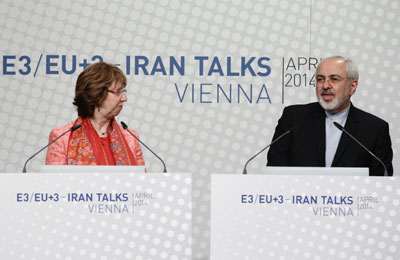
Ashton (L) and Zarif address a news conference.
Agreement on 60pc of issues says Iran
Vienna, April 9, 2014
Iranian Foreign Minister Mohammad Javad Zarif said on Wednesday that the Islamic Republic and major powers had reached agreement on up to 60 percent of the issues regarding the country's disputed nuclear activities.
"We have agreement over 50 to 60 percent of the (final) draft ... but the remaining parts are very important and contain various issues," Zarif told reporters.
The negotiators from Iran and the so-called P5-plus-one - the United States, Russia, China, Britain, France and Germany - plan after their two days of talks in Vienna to start drafting the agreement to meet a self-imposed July 20 deadline.
They will begin their next round of talks in the Austrian capital on May 13, European Union foreign policy chief Catherine Ashton, coordinating the talks for the powers, told reporters while standing next to Iranian Foreign Minister Mohammad Zarif.
"A lot of intensive work will be required to overcome the differences," she said. "We will now move to the next phase in the negotiations in which we will aim to bridge the gaps in all the key areas and work on the concrete elements of a possible comprehensive agreement."
Zarif read out the same statement in Farsi.
The stakes are high. Western powers, along with Russia and China, want to avert an escalation of tensions in the Middle East in the form of a new war or a regional nuclear arms race. Israel, believed to be only nuclear-armed nation in the Middle East, has threatened to take military action against Iran if it is not satisfied that the nuclear programme is curbed.
"The Iranians clearly have a sense of urgency to get a deal done, as does the P5+1 (the six powers)," a senior diplomat close to the talks said.
"We know that there are still some significant gaps that remain and know this process will not be easy. But we're all committed to getting it (an agreement) done by July 20," the diplomat added, in an assessment echoed by other Western envoys.
The toughest areas to be tackled are Iran's future uranium enrichment capacity, nuclear facilities that Western powers believe have little or no civilian value, and future nuclear research, as well as a sequence of steps to remove the international sanctions that have crippled Iran's economy.
However, Iran's supreme leader Ayatollah Ali Khamenei said Iran will never slow down its nuclear research programme.
He said Tehran's negotiating team should not yield to issues "forced upon them".
"These negotiations should continue," he told nuclear scientists in Tehran, the official IRNA news agency reported. "But all should know that negotiations will not stop or slow down any of Iran's activities in nuclear research and development."
Despite Khamenei's pledge to the contrary, US and European officials say they will insist on limits to Iran's efforts to develop more efficient enrichment technology, which would enable Tehran to produce sensitive nuclear material at a faster pace.
Background tensions over Russia's involvement in Ukraine and Western threats of further sanctions against Moscow and over the US denial of a visa for Iran's proposed new UN envoy in New York have so far not harmed the nuclear talks, diplomats say.
The six powers' goal is to extend as much as possible Iran's so-called breakout" period - the time it would need to develop a nuclear weapon. US Secretary of State John Kerry said on Tuesday the current Western assessment of Iran's capability in this regard is two months.
Khamenei, who has the last say on Iran's affairs of state, has repeatedly said that Iran's "red lines" are that it will never give up enrichment or shut any nuclear facility.
Among the most stubborn issues are Iran's centrifuge research and development programme, the size of its uranium stockpiles, the future of the Arak research reactor that could eventually yield significant quantities of bomb-grade plutonium, and the future of the Fordow underground enrichment plant, a secret site until Western intelligence uncovered it in 2009. - Reuters







